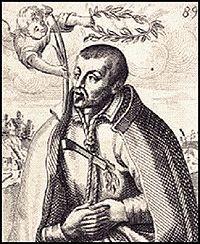Planning worship?
Check out our sister site, ZeteoSearch.org,
for 20+ additional resources related to your search.
- |
User Links
Search Results
When thou dost talk with God, by prayer I mean
Author: Robert Southwell Appears in 2 hymnals
When thou dost talk with God, by prayer I mean
When thou dost talk with God, by prayer I mean
Author: Robert Southwell Hymnal: Hymns of the Ages #d168 (1859) Languages: English
When thou dost talk with God, by prayer I mean
When thou dost talk with God, by prayer I mean
Author: Robert Southwell Hymnal: Lyra Catholica #505 (1851) Languages: English
When thou dost talk with God, by prayer I mean
Robert Southwell

1561 - 1595 Author of "When thou dost talk with God, by prayer I mean" Southwell, Robert, was b. at Horsham St. Faith, Norfolk, about 1561, educated at Paris and at Rome, and entered the Society of Jesus at Rome, Oct. 17, 1578. He spent part of his noviciate at Tournai in Belgium, but returned to Rome and completed his studies there. After being ordained priest in 1584, he returned to England in 1586. He was arrested in 1592 on the charge of high treason, committed to the Tower of London, formally tried at Westminster, Feb. 21, 1594-5, and executed the next day at Tyburn.
His Poetical Works were collected in 1856 by W. B. Turnbull, and re-edited in 1872 more completely and more carefully by Dr. A. B. Grosart, from the Add. manuscript 10422 in the British Museum, from a manuscript, perhaps autograph, at Stonyhurst College, Lanes., and from the printed editions of the individual works. One of his carols is noted at p. 210, ii., one of his translations at p. 663, ii., three additional are in the Arundel Hymns, 1902. They are all in Grosart's edition and are here cited as they are found in the Add. 10422, the spelling being preserved:—
1. As I in hoarie winters nyght. [Christmas]. At f. 10 b. This is the admirable poem entitled "The Burning Babe."
2. Behoulde a seelie tender Babe. [Christmas.] At f. 11. See p. 210, ii.
3. In Paschall fest, ye ende of auntient rite. [Holy Communion.] At f. 17 b.
4. Let folly prayse that phaney loues. [Christmas.] At f. 9. The Arundel reads "what fancy loves."
5. Prayse, 0 Syon, prayse, prayse thy Saviour. At f. 16. From the "Lauda Sion," p. 663, ii.
See also notices in the Month for Oct. 1894, and Feb. and March 1895, and in the Dublin Review, Oct. 1903. [Rev. James Mearns, M.A.]
--John Julian, Dictionary of Hymnology, New Supplement (1907)
Robert Southwell


 My Starred Hymns
My Starred Hymns

